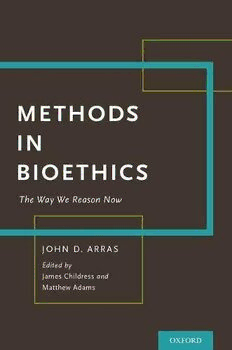
Methods in bioethics : the way we reason now PDF
Preview Methods in bioethics : the way we reason now
i Methods in Bioethics ii iii i Methods in Bioethics The Way We Reason no W John D. Arras Edited by James Childress and Matthew Adams i 1 iv 1 Oxford University Press is a department of the University of Oxford. It furthers the University’s objective of excellence in research, scholarship, and education by publishing worldwide. Oxford is a registered trade mark of Oxford University Press in the UK and certain other countries. Published in the United States of America by Oxford University Press 198 Madison Avenue, New York, NY 10016, United States of America. © Oxford University Press 2017 All rights reserved. No part of this publication may be reproduced, stored in a retrieval system, or transmitted, in any form or by any means, without the prior permission in writing of Oxford University Press, or as expressly permitted by law, by license, or under terms agreed with the appropriate reproduction rights organization. Inquiries concerning reproduction outside the scope of the above should be sent to the Rights Department, Oxford University Press, at the address above. You must not circulate this work in any other form and you must impose this same condition on any acquirer. CIP data is on file at the Library of Congress ISBN 978– 0– 19– 066598– 2 9 8 7 6 5 4 3 2 1 Printed by Sheridan Books, Inc., United States of America v To My Family: My wife, Liz Emrey My daughters, Melissa and Marina and their husbands, Mark and Jeff My grandchildren, Luke, John, Grace, Gabriel and Alex My brother, Dr. Ernest E. Arras, whose provocative and thoughtful discussions about bioethics sparked this book vi “So I sat there and smoked my cigar until I fell into a reverie. Among others I recall these thoughts. You are getting on, I said to myself, and are becoming an old man without being anything, and without really taking on anything. Wherever you look about you on the other hand, in literature or in life, you see the names and figures of the celebrities, the prized and acclaimed making their appearances or being talked about, the many benefactors of the age who know how to do favours to mankind by making life more and more easy, some with railways, others with omnibuses and steamships, others with the telegraph … then suddenly this thought flashed through my mind: You must do something, but since with your limited abilities it will be impossible to make anything easier than it has become, you must, with the same humanitarian enthusiasm as the others, take it upon yourself to make something more difficult. This notion pleased me immensely …” soren kierkegaard, trans. Alastair Hannay, Concluding Unscientific Postscript (Cambridge: Cambridge University Press, 2009), 156–7. vii i Contents Editorial Note ix Preface xv 1. Principlism: The Borg of Bioethics 1 2. A Common Morality for Hedgehogs: Bernard Gert’s Method 27 3. Getting Down to Cases: The Revival of Casuistry in Bioethics 45 4. Nice Story, but So What? Narrative and Justification in Ethics 75 5. Dewey and Rorty’s Pragmatism and Bioethics 100 6. Freestanding Pragmatism in Bioethics and Law 138 7. A Method in Search of a Purpose: The Internal Morality of Medicine 155 8. One Method to Rule Them All? Reflective Equilibrium in Bioethics 175 9. Concluding Reflections: Method in Bioethics— The Very Idea 203 Index 213 vii viii ix Editorial Note i The late John d. arras was a rigorous scholar, brilliant teacher, remarkable col- league, generous collaborator, eager and witty conversationalist, splendid human being, and a great friend to many. At the height of his powers, unbowed by an assortment of ailments, he died suddenly and unexpectedly on March 9, 2015, at age sixty-n ine. At the time of his death, he was the William and Linda Porterfield Professor of Bioethics, Professor of Philosophy, Professor of Public Health Sciences, and a core faculty member of the Center for Biomedical Ethics and Humanities in the School of Medicine at the University of Virginia (UVA). He was also a long- time fellow of the Hastings Center, a major research center in bioethics. A native Californian, John completed his undergraduate studies in philoso- phy and French at the University of San Francisco; his collegiate years included a year at the Institute of European Studies and University of Paris. He received his Ph.D. in philosophy from Northwestern University in 1972. While completing his doctorate, he and his wife, Liz Emrey, served as Peace Corps volunteers in Sierra Leone. After teaching philosophy at the University of Redlands for a decade, he taught bioethics at the Albert Einstein College of Medicine-M ontefiore Medical Center in the Bronx for fourteen years. In 1995, following a national search, John was appointed to the newly estab- lished Porterfield Chair in Bioethics at UVA. Given a mandate to develop an under- graduate program in bioethics, he did so with a flourish, involving faculty from several departments in building a model interdisciplinary program that earned ix
